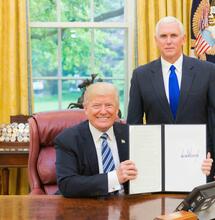The Legal Landscape in Bermuda

There's an ongoing fight to legalise cannabis in the British overseas territory. As lawmakers struggle to find the optimal way to move forward with a cannabis reform, its implementation has also threatened a constitutional clash with the UK.
Bermuda's Cannabis Licensing Act became the source of controversy after its reintroduction to the House of Assembly last week. The act passed on Monday, March 28, with a vote of 18 - 6, and was tabled to the House of Lords, which will probably get passed next week. Senators at the House of Lords have previously vetoed the same cannabis act, which intends to create the first guidelines for the island's local industry.
House of Lord's senators can only veto legislation once. The act intends to allow both medical and recreational use and establish a regulated framework for at least the import of cannabis. Labelled as a "bad bill", the main criticism of the legislation revolves around the fact it's the same bill that failed last year. One Bermuda Alliance, a local advocacy group, claims the bill will benefit only those who control cannabis imports.
Beyond that, the passage of any bill legalising the recreational use of the drug may lead to a constitutional crisis. As a British island territory, Bermuda is subject to British laws and governor Rena Lalgie is reluctant to sign the bill after it's routinely passed in the Senate.
Governor Lalgie believes that the cannabis bill breaches several international treaties by which Britain and by that also Bermuda are obliged to comply.
However, Bermuda's Premier and leader of the Progressive Labour Party, David Burt, disagrees with Britain and percieves this as an intrusion into Bermuda's domestic affairs and its democratic right to exercise its own regulation on the matter.
According to some legal experts, a constitutional clash with the UK over cannabis legalisation could still be averted.
Peter Sanderson, a barrister experienced in several constitutional law cases, explains that "in 1974, Bermuda passed the Misuse of Drugs Act, which allowed the minister to make exceptions - and London signed off on that."
Mr Sanderson claims that "the minister has the power to change regulations under existing law."
"If the Government then persuaded the Senate to let it go through it could be a way of preventing a constitutional crisis.
"Cannabis could be exempted from the Misuse of Drugs Act regulations. Regulations can exempt activities like production, supply, possession," he says.
Bermuda is not the sole subject that has looked for safe passage of cannabis reform, however. The British Virgin Islands were in a similar situation recently, having to confront the same concerns from the British government. They were given a road map to meet British and international objections at the end.
Cannabis legislation in Bermuda
Bermuda legalised medical cannabis in November 2016, however, a limitation of just 1 gram per year created a situation where patients were pushed to the black market for supplying their stash. Authorities eventually increased that limit but required that patients fill in an application and cover the cost for it to be able to import their medicine.
Bermuda also introduced the Decriminalisation of Cannabis Amendment Act in 2017, which stopped penalising the simple possession of up to 7 grams of the drug.
The Bermudian government released a draft bill called the Medicinal Cannabis Bill in 2019, which intended to create a Medicinal Cannabis Authority that would oversee the cultivation, imports, exports, manufacture, research, development and transfer of cannabis. The same draft also sought to create a register of cannabis strains and establish other regulations necessary for the administration of cannabis infrastructure. While the Bermudian Parliamentary House passed this bill, it died in the Senate by a single vote on March 3, 2021.
The current legal complexities should not deter Bermuda's officials from finetuning discussion and advance on cannabis reform. There is still time and space for both Bermuda and Britain to sit down and negotiate a compromise that satisfies both sides, both Britain's treaty obligations and Bermuda Government's democratic right to regulate the cannabis sector on its own terms.



